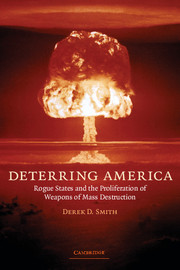Part III - Responding to the threat
Published online by Cambridge University Press: 22 September 2009
Summary
The preceding chapters suggest that although deterrence is still a powerful force in international affairs, it may be operating in ways deleterious to US security. Specifically, the proliferation of WMD is expanding the number of states capable of making substantial deterrent threats. Thankfully WMD have not been used on the battlefield against the United States, but in the tense conflicts with Iraq and North Korea, they are certainly being used at the negotiating table. In fact, virtually every military engagement involving the United States over the past decade or so – ranging from the Bosnian war to Operation Desert Fox – has involved open references to unconventional warfare.
Of course, as the wars in Iraq demonstrated, the United States is not easily deterred, especially when an adversary undertakes open aggression or has limited WMD capabilities. Generally speaking, the immense military advantages the United States enjoys will be more than sufficient to persuade any adversary that the costs of aggressive action would far outweigh any benefits. However, the crises with North Korea reveal the limits of this perspective. The United States can hardly make its conventional forces more fearsome, and there are substantial moral restraints against using its nuclear arsenal in all but the most extreme situations. As a result, the excessive power of American nuclear weapons may paradoxically make an adversary's threat to use WMD more credible. Expecting that any US counterattack would remain conventional, a regional power may be more likely to resort to nonconventional weapons.
- Type
- Chapter
- Information
- Deterring AmericaRogue States and the Proliferation of Weapons of Mass Destruction, pp. 93 - 96Publisher: Cambridge University PressPrint publication year: 2006



